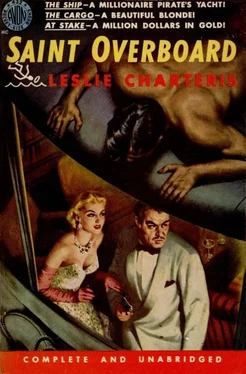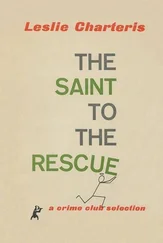Her hands unclasped from her knees, and she opened her bag to take out a cigarette. He propped himself up on one elbow to light it for her. Then he took her hand and held it. She tilted her golden-chestnut head back against the bulkhead, and a shaft of sunlight through the porthole lay across her face so that she looked like a fallen angel catching the last light from heaven. He had no regrets.
"We have had one or two exciting days," she said.
"Probably we've had exciting lives."
"You have."
"And you. If I can imagine all you haven't told me… You're not a bit like a detective, Loretta."
"What should I be?"
He shrugged.
"Tougher?" he said.
"Don't you think I'm tough?"
"Yes. I know you are. But not all through."
"Ought I to be an ogre?"
"You couldn't. Not with a mouth like yours. And yet…"
"I oughtn't to have a heart."
"Perhaps."
"I know. I must get rid of it. Do you think there'd be any second-hand market for it?"
"I could introduce you to a second-rate buccaneer who'd make a bid."
She laughed.
"And yet you're not everything that a second-rate buccaneer ought to be — not as I've known them."
"Tell me."
She considered him for a while, with a shadow of wistfulness in her mocking gaze that made him aware of his own hunger, though her parted lips still smiled.
"You're kind," she said simply, "and you want so much that you can never have. You have an honour that honest people couldn't understand. You're not fighting against laws: you're fighting against life. You'd tear the world to pieces to find something that's only in your own mind; and when you'd got it you'd find it was just a dream… Besides, you don't talk out of the side of your mouth enough."
He was silent for a moment.
"I expect I could cultivate that," he said at length, and sat up so that he could put her hand to his lips. "Otherwise, we aren't so different. We both wanted something that wasn't there, and we set out to find it — in our own ways."
"And now we've found plenty." She glanced out of the porthole, and turned back to him thoughtfully. "We'll probably both be down somewhere in the sea before the sun comes up again, Saint… It's a funny sort of thought, isn't it? I've always thought it must be so exasperating to die. You must always leave so much unfinished."
"You're not afraid."
"Neither are you."
"I've so much less to be afraid of."
She closed her eyes for a second.
"Oh, dishonour! I think I should hate that, with death after it."
"But suppose it had been a choice," he said conversationally. "You know the old story-book formula. The heroine always votes for death. Do you think she really would?"
"I think I should like to live," she said slowly. "There are other things to live for, aren't there? You can keep your own honour. You can rebuild your pride. Life can go on for a long while. You don't burn your house down because a little mud has been trodden into the floor."
Simon looked over his shoulder. The sea had turned paler in the glassy calm of the late afternoon, and the sky was without a cloud, a vast bowl of blue-tinted space stretching through leagues of unfathomable clearness beyond the sharp edge of the horizon.
"Meanwhile," he said flippantly, "we might get a bit more morbid if I told you some more about the horrible dilemma of Elphinphlopham."
She shook her head.
"No."
"You're right," he said soberly. "There are more important things to tell you."
"Such as?"
"Why I should fall in love with you so quickly."
"Weren't you just taking advantage of the garden?" she said, with her grey eyes on his face.
"It may have been that. Or maybe it was the garden taking advantage of me. Or maybe it was you taking advantage of both. But it happened."
"How often has it happened before?"
He looked at her straightly.
"Many times."
"And how often could it happen again?"
His lips curved with the fraction of a sardonic grin. Vogel had never promised him life — had never even troubled to help him delude himself that his own life would be included in the bargain. Whether he opened the strong-room of the Chalfont Castle or not, Vogel had given his sentence.
Simon Templar had had the best of outlawry. He had loved and romanced, dreamed and philandered and had his fling, and loved again; and he had come to believe that love shared the impermanence of all adventures. Of all the magnificent madnesses of youth he had lost only one — the power to tell himself, and to believe, that the world could be summed up and completed in one love. Yet, for the first time in his life, he could tell the lie and believe that it could be true.
"I don't think it'll happen again," he said.
But she was laughing quietly, with an infinite tenderness in her eyes.
"Unless a miracle happens," she said. "And who's going to provide one?"
"Steve Murdoch?" he suggested, and glanced round the bare white cabin. "This is the dungeon I fished him out of. He really ought to return the compliment."
"He'll be in St Peter Port by now… But this boat is the only address he's got for me, and he won't know where we've gone. And I suppose Vogel won't be going back that way."
"Two friends of mine back there have some idea where we've gone. Peter Quentin and Roger Conway. They're staying at the Royal. But I forgot to bring my carrier pigeons."
"So we'll have to provide our own miracle?"
"Anyway," said the Saint, "I don't like crowds. And I shouldn't want one now."
He flicked his cigarette-end backwards through the porthole and turned towards her. She nodded.
"Neither should I," she said.
She threw away her own cigarette and gave him both her bands. But she stayed up on her knees, as she had risen, listening to the sounds which had become audible outside. Then she looked out; and he pulled himself up beside her.
The Falkenberg was hove to, no more than a long stone's throw from the Casquet Rocks. The lighthouse, crowning the main islet like a medieval castle, a hundred feet above the water, was so close that he could see one of the lighthouse-keepers leaning over the battlements and looking down at them.
For a moment Simon was puzzled to guess the reason for the stop; and then the sharp clatter of an outboard motor starting up, clear above the dull vibration of the Falkenberg's idling engines, made him glance down towards the water, and he understood. The Falkenberg's dinghy had been lowered, and it was even then stuttering away towards the landing stage, manned by Otto Arnheim and three of the crew. As it drew away from the side the Falkenberg got under way again, sliding slowly through the water towards the south.
Simon turned away from the porthole, and Loretta's eyes met him.
"I suppose the lighthouse overlooks the wreck," she said.
"I believe it does," he answered, recalling the chart which he had studied the night before.
Neither of them spoke for a little while. The thought in both their minds needed no elaborating. The staff on the lighthouse might see too much — and that must be prevented. The Saint wondered how drastically the prevention would be done, and had a grim suspicion of the answer. It would be so easy for Arnheim, landing with his crew in the guise of an innocent tripper asking to be shown over the plant…
Simon sat down again on the bunk. His lips were drawn hard and bitter with the knowledge of his helplessness. There was nothing that he could, do. But he would have liked, just once, to feel the clean smash of his fists on Vogel's cold sneering face…
"I guess it's nearly time for my burglary," he said. "It's a grand climax to my career as a detective."
She was leaning back, with her head on his shoulder. Her cheek was against his, and she held his hands to her breasts.
Читать дальше












